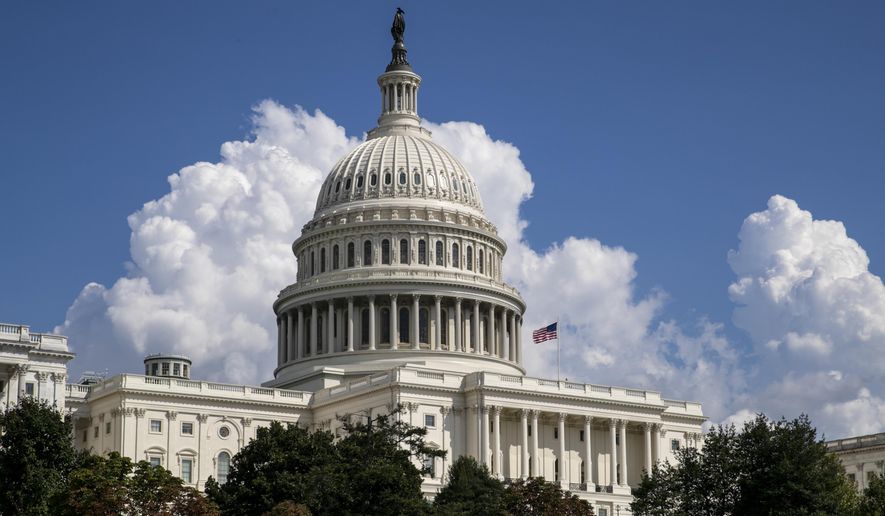House Democrats on Tuesday offered their opening bid in new spending talks, calling for a $350 billion increase in spending in 2020 and 2021 over the levels Congress imposed on itself earlier this decade.
Unable to write a full budget because of internal party feuds, Budget Committee Chairman John Yarmuth is instead proposing a new “caps” deal that would boost both domestic and defense spending, giving lawmakers more room to meet what most of them say is a growing list of unmet needs.
For 2020 the proposal calls for up to $733 billion in defense spending, or $17 billion less than President Trump envisioned in his own proposal. Democrats also want to see base domestic discretionary spending reach $631 billion, or $34 billion over what was spent last year — and far more than Mr. Trump wanted to spend.
Democrats said their plan is more realistic that the budget gimmicks and major domestic cuts Mr. Trump proposed last month.
“By moving this bill forward, we will bring responsible governing back to the budget process, avoid uncertainty and the unrelenting threats of a government shutdown, and meet our obligations to the American people,” said Mr. Yarmuth, Kentucky Democrat.
His plan amounts to a bigger short-term boost to domestic spending levels than defense compared to 2019 — a distribution that will be a tough sell for many Republicans, including Mr. Trump, who has said he won’t accept demands to increase domestic spending at pace with the Pentagon.
“We’ve been saying that we should move beyond these unaffordable dollar-for-dollar caps deals that hold defense spending ransom to billions of dollars in wasteful discretionary spending,” said a senior administration official.
Under the Democrats’ plan, defense and non-defense spending would each see an additional $180 billion or so over the current projected spending for 2020 and 2021.
That even distribution would be a shift from the last two-year deal in 2018, which gave defense a larger share of a $300 billion boost.
But some liberal Democrats were already raising objections to the defense spending levels in the legislation, which Mr. Yarmuth’s committee was slated to consider on Wednesday.
“I get in trouble for speaking out, but you can’t be against endless war and then give Trump exactly what he wants. Progressives must vote no,” tweeted Rep. Ro Khanna, California Democrat and a member of the budget committee.
Brian Riedl, a senior fellow at the Manhattan Institute, said the likely end result will be something like the last deal, where defense came out slightly ahead.
“The president stakes out one position on the far right, the Democrats stake out a position on the far left. They’ll compromise in the middle,” Mr. Riedl said.
Congressional Republicans said Democrats abdicated a basic responsibility by failing to move forward on an actual budget resolution, but said offering a caps deal this early in the process could help Congress write spending bills faster this year — if they can strike a deal with the GOP-led Senate.
“It’ll give us something to mark to, but until they get an agreement with the Senate and the president, it doesn’t mean much. It just gives the ability to move bills out of the House,” said Rep. Tom Cole, Oklahoma Republican.
The spending caps were agreed to in 2011 by President Obama and House Speaker John A. Boehner, setting the stage for actual budget cuts for two straight years.
But since then, Congress has sought ways to avoid the caps, saying they’d cut too deep.
Sen. Rand Paul, Kentucky Republican, criticized that trend, saying that spending more money is currently the “bipartisan consensus.”
“Democrats don’t care about the debt at all. Republicans pretend to care about the debt, and put forward budgets busting the caps as well,” he said. “I think that really we all need to be a little bit more concerned about Congress busting caps, presidents busting caps.”
The Committee for a Responsible Federal Budget estimated that Democrats’ proposal would increase spending by roughly $2 trillion over the next decade because future projections are tied to inflation.
Lawmakers shouldn’t pursue massive unpaid-for spending hikes — nor should they leverage a special war fund to get around the spending caps like the president has proposed, said Maya MacGuineas, the group’s president.
“Budgeting is not as easy as running up the credit card, but it is the most basic function of responsible governing,” she said. “We need a blueprint on how these spending hikes fit into the bigger fiscal picture.”
Democrats, in a memo accompanying their plan, said they do care about rising deficits, but said interest rates are low enough right now that there’s less reason to focus on deficit reduction.
The White House, though, said it’s waiting for a plan that works toward balance.
“The president’s budget lives within current law, reduces deficits, and doesn’t require a caps increase, but if Democrats have an alternate plan to balance the budget then let’s see it,” said the senior administration official.
• David Sherfinski can be reached at dsherfinski@washingtontimes.com.




Please read our comment policy before commenting.